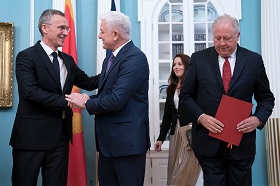Two main motivations are present in the actions of NATO on the western part of the Balkan Peninsula—one strategic and one tactical. In terms of strategic motivation, the policy of luring former Yugoslavian republics into the European sphere of influence (or at least into the sphere of influence of certain countries) has actually existed since 1991. As for tactical motivation, a new impetus appeared in summer–fall 2014, connected to worsening relations between Russia and the West.
By accepting Montenegro into NATO, Brussels sent other countries a signal that Euro-Atlantic prospects are more than real. Nevertheless, internal ethnic, socio-economic, and domestic policy disagreements remain in the region, just as before. The level of trust in the EU and NATO among the general public is still not particularly high in either Montenegro or Serbia.
Russia’s reaction is balanced on the edge of rational necessity. Excessive emotions and use of pleas and exhortations are hardly justified, at least because of the vast difference in status between the two countries.
Reasons for Montenegro’s Accession to NATO
Two main motivations are present in the actions of NATO on the western part of the Balkan Peninsula—one strategic and one tactical. In terms of strategic motivation, the policy of luring former Yugoslavian republics into the European sphere of influence (or at least into the sphere of influence of certain countries) has actually existed since 1991. As for tactical motivation, a new impetus appeared in summer-fall 2014, connected to worsening relations between Russia and the West.|
In the developing “zone of containment” for Russia, which stretches from the Baltic to the Black Sea, it is the Adriatic-Black Sea segment that should worry Brussels the most, in terms of political discipline, bloc loyalty, and security.
Here one can evaluate the Balkan region’s importance for European security. It appears that in the developing “zone of containment” for Russia, stretching from the Baltic to the Black Sea, it is the Adriatic-Black Sea segment that should worry Brussels the most in terms of political discipline, bloc loyalty, and security.
First, the Balkan Peninsula has essentially no tradition of confrontation with Russia. Second, over the last 25 years, Moscow has strived to develop harmonious, constructive relations with all countries in the region. The image of Russia in the Balkans (not only in Serbia and Montenegro, but Croatia and Albania as well) has little in common with the image of Russia in, for example, the Baltic states or Poland. This distinguishes Russia from NATO and an assortment of Western countries, which have launched armed assaults in the region, as well as creating conflicts between and demonizing specific ethnic groups, multiple times in history. Third, complex events in recent history and the delicate position of the region, “stuck” on its way to integration (unlike the aforementioned Baltic States), forced the countries of the region to diversify their foreign policy connections in the 2000s. In essence, all of this has become a reason for Brussels to pay attention to the Balkan region and its problems, which by and large are fairly objective. And anti-Russian rhetoric has become an excuse to begin to act.
Consequences for Russian-Montenegrin Relations
Without a doubt, Montenegrin accession to NATO cannot be called good news. Something that seemed unlikely or unthinkable to most in the mid-2000s and early-2010s has become reality. The pleas of a few experts were left unheard.
Now a question arises: how should such unfavorable changes be understood? Moscow might find them predictable and somewhat acceptable (and if this is the case, overblown emotions are not necessary). Or they might truly be an unpleasant surprise and a consequence of insufficient understanding of the regional situation. This question should be answered by experts, foreign policy structures, and opinion leaders.
Russia’s reaction is balanced on the edge of rational necessity. On one hand, action of some kind is needed. On the other, excessive emotions and use of pleas and exhortations (more often by opinion leaders than diplomats) are hardly justified, at least because of the vast difference in status between the two countries. By appealing to the emotional side of the issue, Russia puts itself in the position of Goliath versus David.
The Russian media campaign on this issue is regrettable. First, because it is a result of insufficient attention towards southeastern Europe. Second, because the campaign is completely inconsistent with Montenegro’s image as a European country historically and culturally close to Russia, which has been formed over many years. Finally, unless something extraordinary happens, many Russians will go to Montenegro again this summer, and what they see there will significantly diverge from the image presented by the press, which might completely discredit certain publications.
Possible Obstacles for Balkan Countries
The consequences of Montenegro’s accession into the North-Atlantic Alliance could be significant. By accepting Montenegro into NATO, Brussels sent other countries a signal that Euro-Atlantic prospects are more than real. At the very least this will give the part of the public that favors a Euro-Atlantic future an incentive to run its own propaganda. For example, speculating about the motivations behind the division between Serbs and Montenegrins, one can develop the idea that Serbia must join NATO. That seems logical, and political leaders will be forced to act based on these changed realities.
Nevertheless, internal ethnic, socio-economic, and domestic policy disagreements remain in the region, just as before. The level of trust in the EU and NATO among the general public is still not particularly high in either Montenegro or Serbia. It is worth separately mentioning the process of the vote to ratify accession into NATO in the Montenegrin parliament: 46 out of 81 deputies voted for ratification, and the other 35 boycotted the meeting. And yet local media wrote that the decision was made unanimously. Clearly, this practice highlights the presence of, at least, elements of societal division.
For Brussels, these conditions are undoubtedly a challenge. And as for Russia, Geo-strategic changes in the Balkans force Russia to consider the region’s new position in Russian foreign policy.





